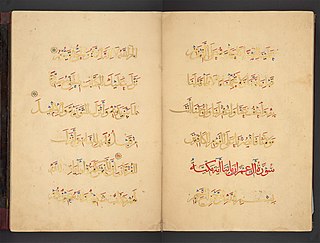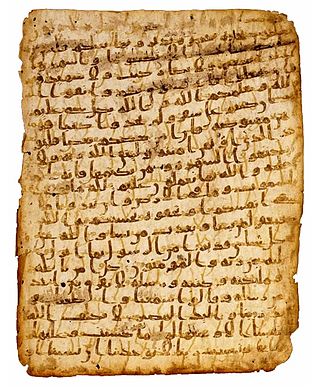Abu al-Fida Isma'il ibn Umar ibn Kathir al-Dimashqi, known simply as Ibn Kathir, was an Arab Islamic exegete, historian and scholar. An expert on tafsir, tarikh (history) and fiqh (jurisprudence), he is considered a leading authority on Sunni Islam.

Muhammad Baqir al-Sadr, also known as al-Shahīd al-Khāmis, was an Iraqi philosopher, and the ideological founder of the Islamic Dawa Party, born in al-Kadhimiya, Iraq. He was father-in-law to Muqtada al-Sadr, a cousin of Muhammad Sadeq al-Sadr and Imam Musa as-Sadr. His father Haydar al-Sadr was a well-respected high-ranking Shi'a cleric. His lineage can be traced back to Muhammad through the seventh Shia Imam Musa al-Kazim. Muhammad Baqir al-Sadr was executed in 1980 by the regime of Saddam Hussein along with his sister, Amina Sadr bint al-Huda.
Injil is the Arabic name for the Gospel of Jesus (Isa). This Injil is described by the Qur'an as one of the four Islamic holy books which was revealed by Allah, the others being the Zabur, the Tawrat, and the Qur'an itself. The word Injil is also used in the Qur’an, the hadith and early Muslim documents to refer to both a book and revelations made by God to Jesus.

Al Imran is the third chapter (sūrah) of the Quran with two hundred verses (āyāt).

An-Nisa' is the fourth chapter (sūrah) of the Quran, with 176 verses (āyāt). The title derives from the numerous references to women throughout the chapter, including verse 34 and verses 4:127-130.
Naskh is an Arabic word usually translated as "abrogation". In tafsir, or Islamic legal exegesis, naskh recognizes that one rule might not always be suitable for every situation. In the widely recognized and "classic" form of naskh, one ḥukm "ruling" is abrogated to introduce an exception to the general rule, but the text the ḥukm is based on is not repealed.
Dawah is the act of inviting people to Islam. The plural is daʿwāt (دَعْوات) or daʿawāt (دَعَوات).

In Islam, angels are believed to be heavenly beings, created from a luminous origin by God. The Quran is the principal source for the Islamic concept of angels, but more extensive features of angels appear in hadith literature, Mi'raj literature, Islamic exegesis, theology, philosophy, and mysticism.
Esoteric interpretation of the Quran is the allegorical interpretation of the Quran or the quest for its hidden, inner meanings. The Arabic word taʾwīl was synonymous with conventional interpretation in its earliest use, but it came to mean a process of discerning its most fundamental understandings. "Esoteric" interpretations do not usually contradict the conventional interpretations; instead, they discuss the inner levels of meaning of the Quran.
Al-Mizan fi Tafsir al-Qur'an, more commonly known as Tafsir al-Mizan or simply Al-Mizan (الميزان), is a tafsir written by the Shia Muslim scholar and philosopher Allamah Sayyid Muhammad Husayn Tabataba'i (1892–1981).
Ibrahim Saeed, sometimes spelled as Sayeed, was an Indian writer and publisher.

Jane Dammen McAuliffe is an American educator, scholar of Islam and the inaugural director of national and international outreach at the Library of Congress.

Islamic holy books are certain religious scriptures that are viewed by Muslims as having valid divine significance, in that they were authored by God (Allah) through a variety of prophets and messengers, including those who predate the Quran. Among the group of religious texts considered to be valid revelations, the three that are mentioned by name in the Quran are the Tawrat, received by prophets and messengers amongst the Children of Israel; the Zabur (Psalms), received by David; and the Gospel, received by Jesus. Additionally, the Quran mentions God's revealing of the Scrolls of Abraham and the Scrolls of Moses.
Muhammad Abdul Haq Ansari was an Islamic scholar from India. He was the Amir (president) of Jamaat-e-Islami Hind (JIH) from 2003 to 2007. He was the member of Central Advisory Council of Jamaat-e-Islami Hind. He was also the Chancellor of Al Jamia Al Islamia, Shantapuram, Kerala. His book Sufism and Shariah is a synthesis of Sufi and Shariah thought, especially a Tatbiq of Shaikh Ahmed Sir Hindi and Shah Waliullah's thought. It grew out of his in-depth engagement with kalam, tasawwuf and fiqh in Islamic history. His other major contributions are a book on Mishkawah's philosophy and an English translation of Ibn Taymiyyah's fatwas with an introduction. He also wrote 'Learning the Language of Quran' it is one of the best English guides for the beginners learning to read the Qur'an. In New Delhi he established the Islami Academy, aimed at training graduates from secular educational background in Islamic Sciences based on the madrasa curriculum.
The Quran states that several prior writings constitute holy books given by God to the prophets and messengers amongst the Children of Israel, in the same way the Quran was revealed to Muhammad. These include the Tawrat, believed by Muslims to have been given by God to the prophets and messengers amongst the Children of Israel, the Zabur revealed to David (Dawud); and the Injil revealed to Jesus (Isa).
Muhammad bin Umar bin Abd al-Rahman bin Abd Allah al-Aqil, better known as Abu Abd al-Rahman Ibn Aqil al-Zahiri, is a Saudi Arabian polymath. He has, at various times, been referred to as a theologian, jurist, historian, ethnographer, geographer, poet, critic and author. As a member of Saudi Arabia's "Golden Generation," he knew of life both during the poverty of the pre-oil boom era and the prosperity of the 1950s onward.
Abdul Aziz bin Ali al-Harbi is a Saudi Arabian Islamic scholar and associate professor at Umm al-Qura University in Mecca. He is one of the founders and the current president of the Arabic Language Academy in Mecca.

Muhammad Quraish Shihab is an Indonesian Muslim scholar in the sciences of the Qur'an, an author, an Academic Scholar, and former Minister of Religious Affairs in the Fourth Development Cabinet (1998). He is the older brother of the former Coordinating Minister for People's Welfare, Alwi Shihab.







